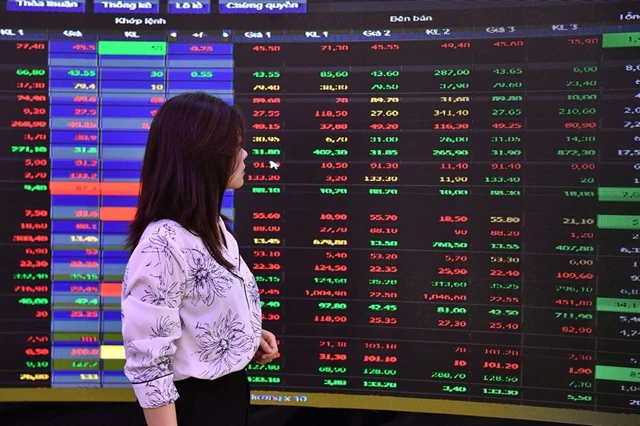Securities firms see bright picture for market in July
The Vietnamese stock market is expected to trade positively in July thanks to the second quarter optimistic business results, said insiders.

The Vietnamese stock market is expected to trade positively in July thanks to the second quarter optimistic business results, said insiders.
The Viet Dragon Securities Corporation (VDSC) said that the second quarter results will continue to be positive, following improved economic and credit growth since the end of March.
The VDSC estimates total market revenue will begin recovering, though at a lower growth rate than the same period last year. Profit after tax growth of the listed enterprises is expected to reach 13% year-on-year, implying improved net profit margins.
However, exchange rate pressure and rising interest rates will remain a burden. Deposit rates have increased 30-50 basis points from end-March, but are still lower than end-2023. Prolonged US dollar strength and high foreign exchange demand could prompt the central bank to raise interest rates in the third quarter.
The securities firm expects the economy's capital absorption capacity to gradually increase, especially towards the end of 2024, causing interest rates to continue rising. They consider an additional 50-100 basis point increase from pre-pandemic levels to be reasonable.
Given the conflicting factors, the VDSC believes the market will maintain the volatility seen in recent months.
The second quarter earnings season in July could allow the VN-Index to reach 1,300 points, the securities firm said, adding that exchange rate pressures and potential central bank rate hikes, however, could also push the index back to 1,240 points, or even 1,180-1,220 points in the next quarter.
The benchmark index closed June at 1,245 points, with trading volume declining.
The index's price chart has not yet been able to break through the key psychological resistance level of 1,300 points.
Experts from Yuanta Securities assess that the market is still in a period of strong positive volatility. As a result, they remain optimistic that the VN-Index will soon surpass the 1,300-point resistance level this month.
The forecast is based on the expectation that the US Federal Reserve will cut interest rates in September, which would provide a supportive factor for the market's uptrend in the third quarter. Additionally, positive macro-economic data and second quarter growth reported by listed companies are also expected to bolster the market's upward momentum in July.
Similarly, positive domestic macro- economic factors are expected to support the market in the second half of the year, a report of ABS Research shows.
The analysts note that the recovery in production, consumption, exports and supportive policies for businesses and the public should allow the economy to maintain solid growth. This, in turn, is expected to improve market liquidity and reduce foreign investors' net selling.
In the near-term, ABS forecasts the VN-Index will trade sideways within the 1,170 - 1,300 range, building an accumulation pattern on the daily chart. This consolidation phase in July is seen as preparing the ground for a sustainable upward move above 1,300 points later this year.
According to the latest SSI Research report, the VN-Index has retreated slightly after briefly surpassing 1,300 points in June. Technical indicators like the relative strength index (RSI) and average directional index (ADX) suggest the market may not be as optimistic in July 2024 as previously expected.
However, SSI believes the VN-Index's medium-term uptrend remains intact, as it has not breached the 1,195-1,205 support level. It expects the index to fluctuate in the 1,220-1,295 range this month.
With the mixed factors, SSI advises caution and patience. Investors should wait for attractive price levels while holding on to stocks with strong growth potential. The report also notes potential rotation into sectors like real estate, retail and exports that could benefit from policies./.








